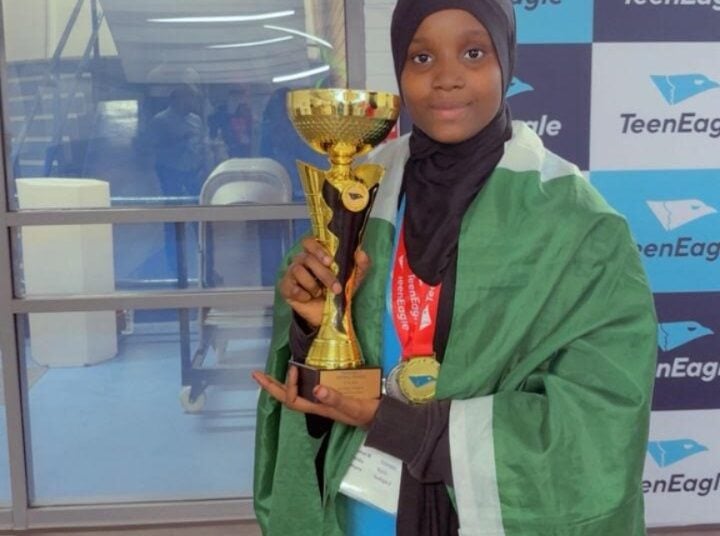Recently, three teenage girls from Yobe State lifted Nigeria’s name on the global stage. Nafisa Abdullahi Aminu, Rukayya Muhammad, and Hadiza Kashim Kalli emerged champions in English communication and debate at the 2025 TeenEagle Global Finals in London. Competing among over 900 students from 46 countries, they proved that Nigerian intellect can shine anywhere.
The Teeneagle competition is an International, Resource-based English Language Competition that helps students gain global recognition and shine online to earn certificates and worldwide recognition.
Although there are debates around the authenticity and integrity of the event, however, an event happened in University of Surrey where Nigerian girls from TULIP secondary school in Yobe State participated and won trophies. Their victory should have been a national moment. Yet, apart from a short congratulatory message from the Presidency and a reception by the Yobe State Governor, Alhaji Mai Mala Buni, the nation largely met this feat with silence. No national celebration. No prime-time interviews. No recognition befitting a rare intellectual triumph.
The same country that floods the streets with parades for sports victories seemed uninterested in this cerebral achievement.
This disparity speaks volumes. It reveals a misalignment in national value perception, one that prizes spectacle over substance. We celebrate the visible and glamorous, while neglecting the quiet, transformative power of education and intellectual skill.
The contrast is telling; when the Super Falcons won the Women African Cup of Nations (WAFCON), they earn national honours, generous cash rewards, and a presidential hand-shake. Yet when young minds triumph intellectually the applause is faint.
Sports victories are worth celebrating, because no event in Nigeria’s history unites its people like football. But so too are the triumphs of debate, literature, science, and innovation. The win by these Yobe girls should not be seen as an isolated event, but it is evidence of the brilliance that exists in Nigeria’s classrooms and minds, waiting to be nurtured.
However, as exceptional as this victory may sound, their story is an exception in a state where universal access to basic education remains among the lowest in the country. For Yobe State with a literacy level of only 7.23 per cent, and the lowest in the country, celebrating these three girls without addressing the thousands of Yobe children who may never see the inside of a classroom would be hollow. Development is not built on pockets of excellence surrounded by seas of exclusion, it is built on giving every child, regardless of background, the opportunity to learn, grow, and compete.
In developed nations, universal access to quality education is not negotiable. Every child is given a fair start. In Nigeria, we continue to create elite enclaves while leaving millions behind. This pattern fuels inequality, limits social mobility, and threatens national stability and, therefore, necessitates the need for policy shift in the nation’ education policy. We need to ensure accountability in funding universal access to education.
Experts aver that Nigeria has never lacked individual brilliance—from Ayodele Awojobi and Chike Obi to IyaAbubakar and Jelani Aliyu. What we have lacked is the political will to ensure that brilliance is not the privilege of the few, but the right of all. The majority of Nigerian children, especially in the North, remain out of school—trapped in cycles of poverty that no single debate trophy can undo.
We believe that this moment must be more than a congratulatory handshake. The Federal Ministry of Education, the Ministry of Women Affairs, and state governments must seize it as a call to action. Yobe State, in particular, must go beyond celebrating its champions and commit to dismantling the barriers keeping thousands of its children from classrooms. It is one of the most destabilised states in Nigeria due to the activities of Boko Haram in the last decade and a half. As of 2023, more than 609 schools were destroyed by Boko Haram and many more remained closed indefinitely.
Let the victory of Nafisa, Rukayya, and Hadiza be the spark for a renewed national effort, to reinvigorate public schools, to make quality education accessible to all, and to align the nation’s priorities with the truth that her greatest asset is the educated mind. Only then will Nigeria’s successes, whether on the field or in the classroom, become the norm, not the exception.





